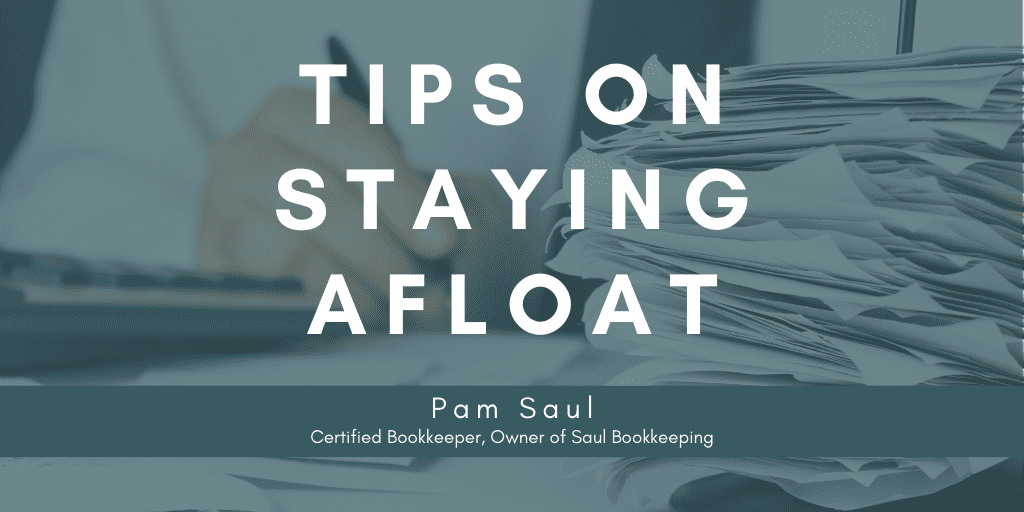Pam Saul, a Certified Bookkeeper and Owner of Saul Bookkeeping, wanted to come up with a way to help small businesses have a feeling that they have some control in these uncertain and difficult times. Here are some things that you can do for your clients, your services or products, your finances, and for yourself.
Your Clients
- Check in with your clients and see how they are doing.
- Ask your clients if there is anything extra you can help them with.
- Review your client list and see who may be hit the hardest in their cash flow. Contact them and see what they are doing to try and continue working.
- Is there something you can do to help?
- Can you offer to stop services until a future date that you both agree to?
- If they close, are you going to continue to provide services?
- Make sure any new clients are able to pay you!
Your Services/Products
- Can you offer a prepaid discount?
- Do you have a package program?
- Can you take any of your services and offer them online?
- Do you have a new service/product that you want to try?
- Can you use Zoom or other streaming service to work remotely?
- Can you work with any of your (sub)contractors to offer a combined service?
- Can you sell inventory? Put a hold on orders or curtail buying more?
- Ask for upfront partial or full payments with any new clients.
Your Finances
- Make sure your books are up to date (shows all your income/expenses) and reconciled.
- Get out all billable services/products by invoice now!
- Always pay payroll taxes first…always!
- Check with your payroll provider on current state withholding and unemployment regulations (changing on a daily basis)
- Also check regarding the Families First Coronavirus Response Act regarding sick leave
- Work on your Accounts Receivable (money your clients owe you) and see if you can get any overdue invoices paid now.
- Shut off all automatic payments from your account. Gives you leverage to decide what to pay.
- If you have access to a Credit Union, their requirements for a loan aren’t as stringent as a bank.
- Contact your local bank manager and see if you can get a Line of Credit (LOD) before you need it.
- If you have a LOC, see if you can get it increased
- If you do need a loan, make sure you specify that this is directly related to the actions regarding COVID-19
- Call your insurance agent and see what you need to do while out of work.
- Watch for credit card deals that will allow you to transfer balances from other cards for less interest.
- Contact your vendors and see if you can go from 30 days to 45 day or even 60 days to pay your bills.
- Are there any bills you can put on hold?
- Ensure that your product (or service) is priced so that you make a profit. If not, learn why and address it….now. If it is a losing product (or service), increase the price, reduce the input costs, or stop offering the product (or service)
- Can you barter for services?
- Do you have any discretionary spending that you can cut? Monthly subscription you could end?
- Prioritize your bills. Pay any that could shut down your business. Then prioritize by penalty.
- Look at your Cash Flow. Work out what cash you need for the next weeks, then look at what cash is coming in. Do this for the next several months as well.
- Can you extend your payment structure? From due upon receipt to due in 30 days, 45 days, or on hold?
- Do you have any leased property that you can cancel? Make sure to check your lease on requirements and/or penalties for early return.
Yourself
- Make this a learning experience.
- You need to think clearly about your business, not emotionally.
- You need to make informed decisions and not when you are panicked.
- Share your concerns with a non-judgmental person….your mentor, friend, or other person you trust.
- Don’t let shame or guilt make you feel like there is nothing you can do. Take small steps towards positive action.
- Create attainable goals so that you don’t have self-fulfilling failure.
- Realize that it isn’t just you, that we all are dealing with the same issues.
- Make sure to physically take care of yourself. Your health is the most important thing right now.
 By Pam Saul, Certified Bookkeeper, Owner of Saul Bookkeeping
By Pam Saul, Certified Bookkeeper, Owner of Saul Bookkeeping
Having employees may seem overwhelming, but if you take the time to learn what is necessary, you’ll be able to make a better, more informed decision about when your business is ready to grow with employees.
DISCLAIMER: This material has been prepared for informational purposes only, and is not intended to provide, and should not be relied on for, tax, legal or accounting advice. You should consult your own tax, legal and accounting advisors before engaging in any transaction.

